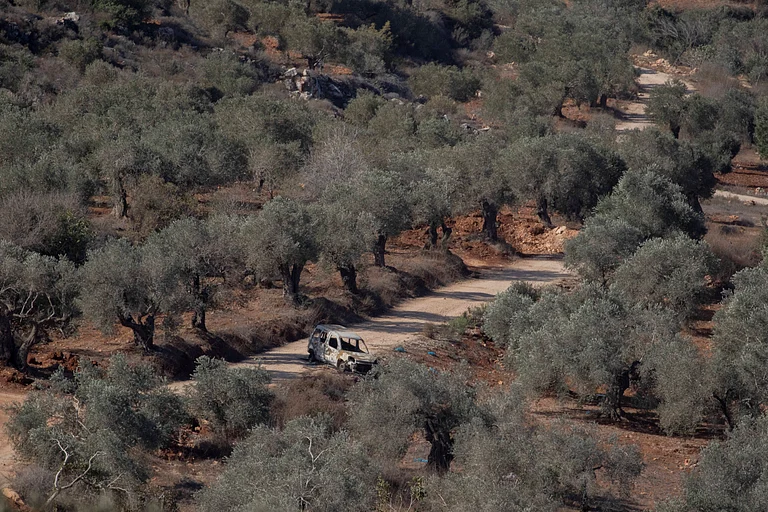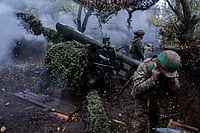India on September 18 abstained from voting on a UN General Assembly resolution that demanded an end to Israel's presence in the occupied Palestinian territory within 12 months, with New Delhi saying that efforts should be made towards "building brigdes" and "not furthering divides".
The 193-member United Nations General Assembly adopted the resolution, with 124 votes in favour, 14 against and 43 abstentions including that by India.
The resolution was titled 'Advisory opinion of the International Court of Justice on the legal consequences arising from Israel's policies and practices in the Occupied Palestinian Territory, including East Jerusalem, and from the illegality of Israel's continued presence in the Occupied Palestinian Territory'.
What Does The Resolution Say
The Palestinian-drafted resolution demanded that "Israel brings to an end without delay its unlawful presence in the Occupied Palestinian Territory, which constitutes a wrongful act of a continuing character entailing its international responsibility, and do so no later than 12 months from the adoption of the present resolution."
The resolution also strongly denounced the continued and total disregard by the Israeli government of its obligation under the UN Charter, international law and the relevant United Nations resolutions, and stressed that such breaches threaten regional and international peace and security.
Israel must be held accountable for any violations of international law in the Occupied Palestinian Territory, including that of international humanitarian law and international human rights law, it said. The resolution said that it "must bear the legal consequences of all its internationally wrongful acts, including by making reparation for the injury, including any damage, caused by such acts".
UN Secretary General Antonio Guterres addressed reporters and said that the death and destruction in Gaza by far is the "largest that I have ever seen in my mandate as Secretary-General" and the violations of international humanitarian law are "totally unacceptable".
“I condemned as I did, and I feel that that condemnation was essential, the terror attacks by Hamas, but what's happening today in Gaza is totally unacceptable,” Guterres said.
Citing Gaza's Health Ministry estimates, the UN Office for the Coordination of Humanitarian Affairs (OCHA) said that between October 7, 2023 and September 16 this year, at least 41,226 Palestinians have been killed and 95,413 injured.
Meanwhile, as per the Israeli military official Israeli sources cited in the media, over 1,542 Israelis and foreign nationals have been killed during this period, majority on October 7 and its immediate retaliation.
India Advocates Dialogue & Diplomacy
Explaining the nation's vote on the resolution, India's Permanent Representative to the UN Ambassador Parvathaneni Harish noted New Delhi's steadfast commitment towards achieving a justice, peaceful and lasting solution to the Israel-Palestine issue.
Harish reiterated that the only a two-state solution through direct and meaningful negotiations can lead to enduring peace.
"India has abstained from today's vote. We have been strong advocates of dialogue and diplomacy. We believe that there is no other way to resolve conflicts," he said. Harish further remarked that there are no winners in conflicts, adding that the cost of such issues is human lives and destruction.
"A joint effort should be directed towards bringing the two sides closer, not drive them further apart. We should strive towards building bridges, not furthering the divides," Harish said.
India urged the UNGA to make a "genuine effort" to strive for peace. Harish pressed on India's commitment to resolution of the condlict and restoration of peace by bringing an end to the human suffering. "We will continue to be guided by this spirit. To this end, we stand ready to continue our engagements towards achieving sustained peace."
The war on Gaza, which was been going on for over 11 months now, has led to the deaths of several thousand people including women and children and the largescale consequent humanitarian crisis, Harish noted.
India's Permanent Representative to the UN then emphasised that India has been clear and consistent on its stance on the conflict from the beginning. Harish said New Delhi has been unequivocally condemned the terror attacks on Israel on October 7, 2023, and also condemned the loss of civilian lives in the conflict, called for an immediate ceasefire, and an immediate and unconditional release of all hostages.
India stands for unrestricted and sustained humanitarian assistance in the Gaza Strip, Harish said.
A Look At India's Previous Abstentions
UN Resolution On Russia's Offensive In Ukraine
In July, India had abstained on a UNGA resolution that demanded that Russia immediately end its aggression against Ukraine and urgently withdraw its military and unauthorised personnel from the Zaporizhzhia nuclear power plant.
The resolution was adopted in the General Assembly with 99 votes in favour, nine against and 60 abstentions including that of India, Bangladesh, Bhutan, China, Egypt, Nepal, Pakistan, Saudi Arabia, South Africa and Sri Lanka.
The draft resolution, introduced by Ukraine and sponsored by over 50 member states, also demanded that the Russian military immediately return the full control of the Zaporizhzhia nuclear power plant to the sovereign and competent authorities of Ukraine to ensure its safety and security.
It also called for the "immediate cessation of the attacks" by Russia against the critical energy infrastructure of Ukraine, which increases risk of a nuclear accident.
Russia's First Deputy Permanent Representative Dmitry Polyanskiy had said in the UNGA that it has "unfortunately" adopted many documents that are non-consensual, politicised and do not reflect reality.
"Make no mistake: votes in favour of today's draft will be regarded by Kyiv, Washington, Brussels and London as evidence of support for their policy of further escalating the Ukrainian conflict to the detriment of steps taken by a sensible part of the international community to find a peaceful, sustainable and long-term solution to the conflict," Polyanskiy said.
UN Resolution On Islamophobia
In March this year, UNGA had adopted a resolution titled 'Measures to combat Islamophobia' which was introduced by Pakistan and co-sponsored by China.
India along with 43 other nations had abstained from voting on the draft resolution, while 115 nations voted in favour and none against.
India's Permanent Representative to the UN at the time, Ambassador Ruchira Kamboj, had voiced condemnation of all acts motivated by anti-Semitism, Christianophobia and Islamophobia, asserting that it is crucial to acknowledge that such phobias extend beyond Abrahamic religions.
"Clear evidence shows that over decades, followers of non-Abrahamic religions have also been affected by religiophobia. This has led to the emergence of contemporary forms of religiophobia, particularly anti-Hindu, anti-Buddhist and anti-Sikh sentiments," she said explaining India's stance on the resolution.
She had said it is important that the UN maintain its stance above such religious concerns, "which have the potential to fragment us to rather than unite us under the banner of peace and harmony, embracing the world as one global family".
India called on all member states to consider that other religions also being subject to discrimination and violence. "Allocating resources solely to combat Islamophobia, while neglecting similar challenges faced by other faiths, might inadvertently perpetuate a sense of exclusion and inequality," Kamboj had said.
The Ambassador noted that Hinduism with over 1.2 billion followers, Buddhism with over 535 million and Sikhism with over 30 million followers worldwide, are all subject to religiophobia, "It is time that we acknowledge the prevalence of religiophobia, rather than single out just one."
This, she said, is also evident in the increasing attacks on religious places of worship like gurudwaras, monasteries and temples, as well as spreading of hatred and disinformation against non-Abrahamic religions in several countries.
Ruchira Kamboj had pointed out that India stands against all forms of religiophobia, be it anti-semitism, Christianophobia, or Islamophobia as "we stand against all anti-Hindu, anti-Buddhist, and anti-Sikh sentiments".
Notably, the resolution had also requested the UN Secretary-General to appoint a UN Special Envoy to combat Islamophobia, to which, Kamboj had said that India "in principle" is opposed to creating a post of a Special Envoy on the basis of a single religion.
Truce In Israel-Hamas Conflict
Last year in October, days after Hamas launched an unprecedented attack on Israel and Tel Aviv's immediate retaliation, India had abstained from voting on a resolution that called for an immediate humanitarian truce in the conflict.
The resolution, drafted by Jordan, had also called for uninterrupted humanitarian access in the Gaza Strip and did not have any mention of Hamas.
The resolution titled 'Protection of civilians and upholding legal and humanitarian obligations' was adopted with 120 votes in favour, 14 against and 45 abstentions.
India's Deputy Permanent Representative, Yojna Patel, had explained India's vote and siad that the October attacks were shocking, calling for the immediate release of hostages taken by Hamas. Patel had said that the issue of increasing casualties in Gaza and the subsequent humanitarian crisis also needs to be addressed.
She had said that violence does not pave the way of any workable solutions. She also termed the terror attacks in Israel to be "shocking" saying that terrorism is a malignancy and knows no borders, nationality or race.
"The world should not buy into any justification of terror acts. Let us keep aside differences, unite and adopt a zero-tolerance approach to terrorism," Patel had said.
Patel reiterated India's stance on Palestine, including the support for a two-state solution which would result in the "establishment of a sovereign, independent and viable state of Palestine living within secure and recognised borders, side-by-side in peace with Israel".
"Our vote was guided by India's steadfast and consistent position on the issue," a person familiar with the matter had been quoted as saying by Hindustan Times.
India had urged all member states to "de-escalate, eschew violence and work towards creating conditions for an early resumption of direct peace talks".
However...
It is to notable that India has voted in favour of UN resolutions in the past. In May this year, India had voted in favour of a UNGA draft resolution that said Palestine is qualified and should be admitted as a full member of the United Nations and recommended that the Security Council "reconsider" the matter "favourably".
The resolution had received 143 votes in favour, nine against and 25 abstentions. The document had determined that "the State of Palestine is qualified for membership in the United Nations" in accordance with Article 4 of the UN Charter and "should therefore be admitted to membership in the United Nations".
In November last year, India had voted in favour of the UN resolution which condemned the settlement activities in the Occupied Palestinian Territory, including East Jerusalem, and in the occupied Syrian Golan. Including India, 145 nations had voted in favour of the resolution while seven voted against and 18 abstained.
The UNGA adopted the "Israeli settlements in the Occupied Palestinian Territory including East Jerusalem, and the occupied Syrian Golan" with an overwhelming majority.
It is notable that India has consistently maintained its stance on such conflicts, advocating for peace and negotiations through diplomatic channels. The nation and Prime Minister Narendra Modi has asserted that "a solution cannot be found in a battlefield".























